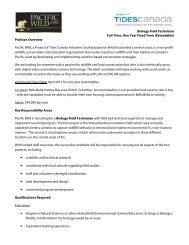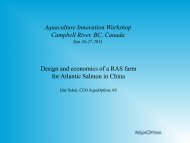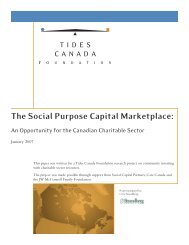Entrepreneurial Solutions to Insoluble Problems - Tides Canada
Entrepreneurial Solutions to Insoluble Problems - Tides Canada
Entrepreneurial Solutions to Insoluble Problems - Tides Canada
- No tags were found...
Create successful ePaper yourself
Turn your PDF publications into a flip-book with our unique Google optimized e-Paper software.
Growing Opportunity5One thing that is likely<strong>to</strong> bewilder mainstreambusiness brains enteringthe world of social enterpriseis the near-fetishfor discussing definitions.Huge effort has beeninvested — and continues<strong>to</strong> be invested — in definingsocial and environmentalentrepreneurship and inidentifying and classifyingthe relevant entrepreneurs10www.sustainability.com/downloads_public/skoll_reports/business_primer.pdf1 IntroductionHow do you grow economic, social,educational, and political opportunity<strong>to</strong> the degree required <strong>to</strong> ensure thatthe 21st century is significantly lessturbulent and violent than the 20th?Part of the answer will be <strong>to</strong> invest inentrepreneurial solutions <strong>to</strong> the world’spressing problems, and <strong>to</strong> build thesystem conditions in which solutionsare encouraged <strong>to</strong> replicate and scale.In this sense, the social and environmentalentrepreneurs discussed inGrowing Opportunity are models of how<strong>to</strong> push <strong>to</strong>wards a more sustainablefuture.But that’s not always how they are seen. 10Business people encountering the world ofsocial entrepreneurship for the first timeoften emerge confused, at least <strong>to</strong> beginwith. The sort of questions they raiseinclude: Why all the excitement? How arethese people different from NGOs? Isn’tentrepreneurship what business alreadydoes? How can you expect the world’spoorest <strong>to</strong> represent any sort of market?And how can ventures operating at thisrelatively small scale ever hope <strong>to</strong> changethe world, as they proclaim their ambition<strong>to</strong> be. All great questions, but before westart looking for answers, it is worthremembering the critics at the time couldeasily have expressed — indeed often did —the same skepticism about the likes ofPasteur, the Wright Brothers or, in morerecent times, Steve Jobs and Steve Wozniak,who not only founded Apple but alsocatalyzed the early growth of the personalcomputer industry.No doubt a great deal of debate went in<strong>to</strong>what a germ was, in<strong>to</strong> what sort of futureaircraft might have or whether PCs wouldever challenge the computing power ofIBM’s ‘Big Iron.’ One thing that is likely<strong>to</strong> bewilder mainstream business brainsentering the world of social enterprise isthe near-fetish for discussing definitions.Huge effort has been invested — andcontinues <strong>to</strong> be invested — in definingsocial and environmental entrepreneurshipand in identifying and classifying therelevant entrepreneurs. Important work,no question, but you tend <strong>to</strong> know thesepeople when you meet them. The aircrackles with energy. They aim <strong>to</strong> turnapparently insoluble crises in<strong>to</strong> <strong>to</strong>morrow’spolitical, social, and market opportunities.Some definitions can be found on page 7,but as Jed Emerson — one of the field’smost influential thought-leaders — warnedus, an over-emphasis on definitions can bedistracting. ‘We risk wasting the comingyears in endless discussions of how manyangels dance on the head of a pin,’ heargued, ‘as opposed <strong>to</strong> what wonderfulgarments we might collectively stitch<strong>to</strong>gether.’The key point is that a range of social,environmental, and governance challengesincreasingly demand something morethan corporate citizenship responses.They require innovative, entrepreneurial,and — often — disruptive strategies whichincumbent companies are often ill-prepared<strong>to</strong> develop or deliver.This isn’t an either social entrepreneurshipor big business agenda, but will involveboth <strong>to</strong>gether. Looking at the worlds ofour three sponsoring organizations, theevidence is clear. A company like the USchemical giant DuPont, with its longstanding‘sustainable growth’ strategy,has the capacity <strong>to</strong> bring new solutions <strong>to</strong>scale. To take just two of DuPont’s 2015goals: it aims <strong>to</strong> grow annual revenues fromproducts that create energy efficiency orcut greenhouse gas emissions by $2 billion,and <strong>to</strong> nearly double revenues from nondepletableresources <strong>to</strong> at least $8 billion.The involvement of German financialservices group, Allianz, underscores thegrowing role of the financial sec<strong>to</strong>r insupporting entrepreneurial solutions <strong>to</strong> thebroad spectrum of sustainability challenges.And Jeff Skoll’s background as a co-founderof eBay spotlights the emergence of verydifferent thinking on how business modelscan be designed <strong>to</strong> replicate and scale —even, if the X Prize Foundation has its way(page 29), in such demanding areas aspoverty alleviation.
















